
Witnessing or experiencing a terrifying event may take a toll on us and trigger traumatic memories and reactions or what is referred to as PTSD.
The healing process can sometimes be challenging, confusing, and complex, causing different, intense, and disturbing symptoms and emotions. However, several recovery techniques have been shown to help.
Books, for example, can be helpful tools on the road to recovery. They will usually have insights that help, and some have stories that patients can relate to.
What is PTSD?
PTSD is an acronym that stands for Post Traumatic Stress Disorder. PTSD is a condition that can develop following the experience or witnessing of a traumatic event. A traumatic event is typically something that causes physical harm or death, or threatens physical harm or death. PTSD can also develop after experiencing or witnessing sexual assault, child abuse, domestic violence, terrorist attacks, and other catastrophic events.
Why Reading PTSD Books Is Important?
Reading books about PTSD is an important way to learn more about the condition. These books can help you understand what PTSD is, how it affects people, and what you can do to help someone who is struggling with the condition.
They can also provide support and comfort to people who are living with PTSD but most importantly they help to put you on a healing track that will change your or your beloved life in a positive manner.
Below are some excellent books on PTSD, that already proved that they are worth to pick up:
What Are The Best PTSD Books?
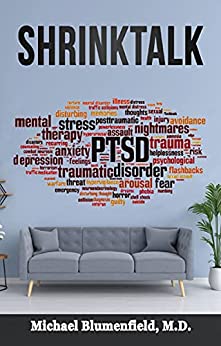
ShrinkTalk, by Michael Blumenfield (2021)
ShrinkTalk is a book that will make you feel as if you are in a psychiatrist’s office. It is a clear overview of therapy and psychiatry. The book details what psychiatrists deal with from what patients reveal. It covers a wide variety of topics like PTSD, anxiety, depression, bipolar effect, suicidal thoughts, effects of the Covid-19 pandemic, and sexuality.
Michael compellingly demonstrates the issues and engages readers to reflect deeply on them. He highlights the ethical, moral, and legal obligations of doctors who deal with mental issues, and that way, readers can become more aware of what is right or wrong during a session.
The fourteenth chapter has questions Michael has been asked before and the answers he has provided. You may relate to them and possibly get yourself some help. This book’s messages resonate more today than ever, and it also helps with diagnosis and treatment.
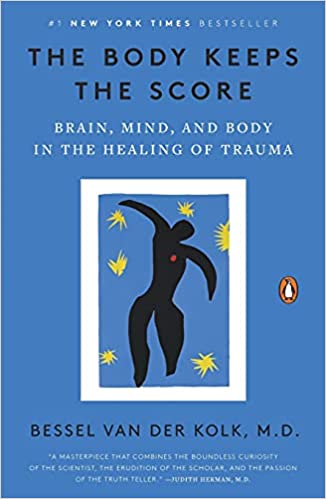
The Body Keeps the Score, by Bessel Van Der Kolk (2015)
Life comes with different kinds of trauma. But in this PTSD book, Bessel helps readers transform their understanding of trauma while providing a bold new healing paradigm. He uses scientific advances to illustrate how trauma reshapes the brain and the entire body. Through that, it compromises someone’s capacities to engage, have self-control, pleasure, and trust. But there are innovative treatments that can help during these situations.
This book explores therapies like neurofeedback, meditation, drama, sports, and yoga which work to activate the brain’s natural neural plasticity. It mainly focuses on the trauma caused by relationships but highlights how relationships are also good ways to heal.
Our minds desperately try to renounce trauma, but our bodies may have us trapped in the past, but we can still find ways to reconnect the two entities for healing.
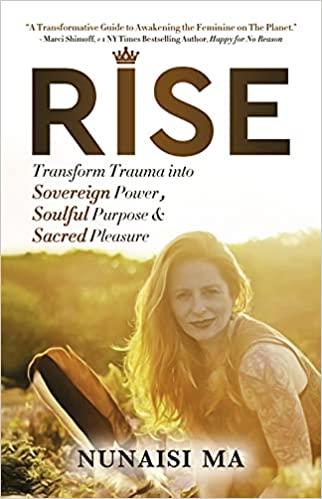
Rise: Transforming Trauma, by Nunaisi Ma (2021)
Trauma wreaks havoc and keeps score in our bodies. However, to emotionally heal ourselves, we need to discover freedom in our hearts and find our light. This book is more than a self-help book with insights from some of the world’s experts that will help transform your trauma. Their stories will motivate and inspire you.
It highlights how these experts have handled and changed their traumas and claimed their sovereignty to live purposeful and passionate lives. You are shown how to reach deep within yourself to unravel your inner strength and courage to return to your wholeness.
This PTSD book is about approaching healing from the inside out. It invites you to rethink and question inner-held beliefs that don’t serve you anymore. There are eye-opening tools, strategic methods, and lessons.
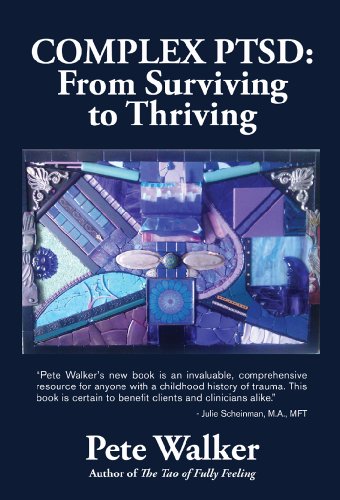
Complex PTSD: From Surviving to Thriving, by Pete Walker (2013)
Do you ever think everything would be fine if you stopped specific thoughts? Well, this thought is very true and, at times, more than we even think. PTSD and depression are more of thought problems than psychological ones.
Thoughts are unending, and, in many ways, they are powerful, influential forces in our lives. If we constantly think about PTSD and depression, we feed these thoughts, reinforce them, and embed them deeper into our minds. This dynamic is what makes most of us not consider a way out.
This book helps us understand what goes on in our heads and how to use the knowledge to conquer our afflictions. It has taught principles on PTSD and depression and has detailed steps to restore and maintain good mental health.
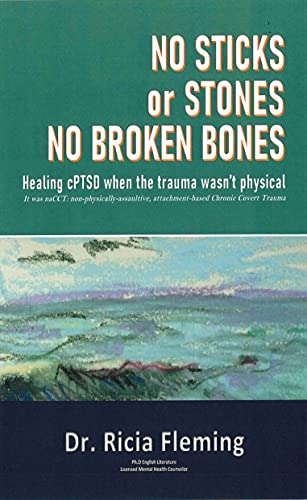
No Sticks or Stones No Broken Bones, by Ricia Flemming (2021)
This book talks about healing chronic PTSD from non-physical trauma. It features different survivor stories you may relate to. It also has strategies you can use to identify, handle, and de-activate hard-to-recognize flashbacks and triggers.
Ricia offers practical guidance grounded in neurobiological trauma research, actionable exercise self-talk scripts, and checklists.
Confusion and cumulative effects are typical when you are dealing with trauma. However, to open the door for healing, it is better to start by acknowledging the symptoms and knowing what to do about them. The issues may be mood swings, battered instincts, emotional dysregulation, lack of fun, passion, purpose, meaningful engagement, spontaneity, delight, and more.
In this book, you will get reassurance that your sickness and troubles make sense, your challenges are valid, and be guided on replacing the negatives with empowerment and self-cherishing.
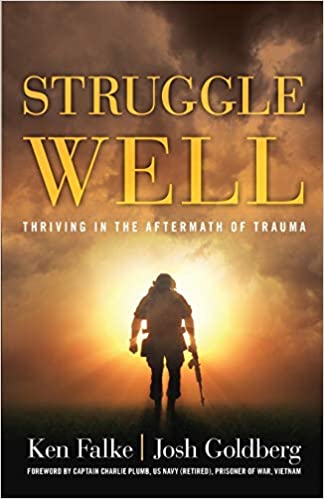
Struggle Well, by Ken Falke & Josh Goldberg (2018)
Struggle Well is a compelling and engaging read for anyone struggling with trauma aftermath. Different people struggle in different ways since struggle comes in various forms, which have been given different names like depression, addiction, anxiety, PTSD, etc.
Nevertheless, no matter what you may be struggling with, one thing is clear: you are not living the way you deserve or desire. But, there is hope. It starts with embracing your struggle instead of fighting it. That is how you will be able to stop surviving and instead begin thriving.
Ken and Josh are PTSD combat veteran trainers who help transform struggle through their work. Through their insights, you will see how you can understand your struggle and attain Posttraumatic Growth (PTG).
If you can achieve PTG, you will be able to discover opportunities even in your situation. This PTSD book offers actionable strategies to help you make peace with past experiences, live in the present, and plan a great future.
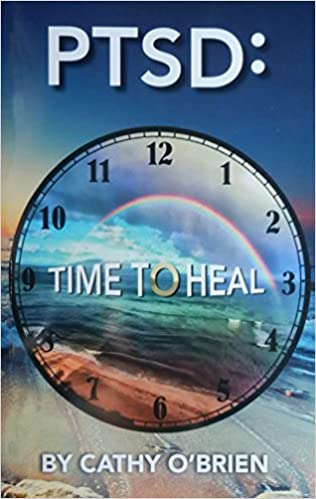
PTSD: Time To Heal, by Cathy O’Brien (2016)
According to Mark Phillips there are specific steps one can take to reclaim control over their own mind and heal from PTSD. Cathy also followed these steps and found great success in overcoming her PTSD symptoms.
The first step is to identify the root cause of your trauma. This may be a difficult task, as often times the root cause is buried deep down and hidden from our conscious minds. However, it is essential that you identify and address the root cause if you want to fully heal from PTSD.
The second step is to release any anger or resentment you may have towards yourself or others for what happened. This is often a difficult step, as it requires forgiveness which can be very challenging. However, it is necessary for healing to take place.
Without going into further details Cathy’s method is a great way to start your healing journey.
Final Thoughts on the best PTSD Books
Even though PTSD recovery and healing are different for everyone, the self-help PTSD books listed above will come in handy during the journey. They contain evidence-based techniques and strategies you can use to cope and get better.
Check also the most important ADHD books that may help you when you face attention deficit hyperactivity disorder.
